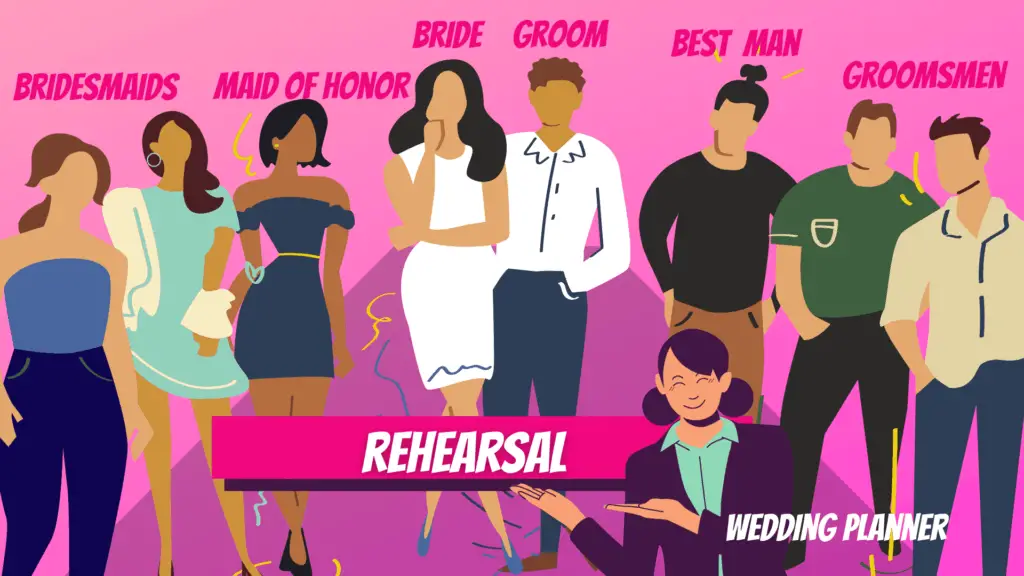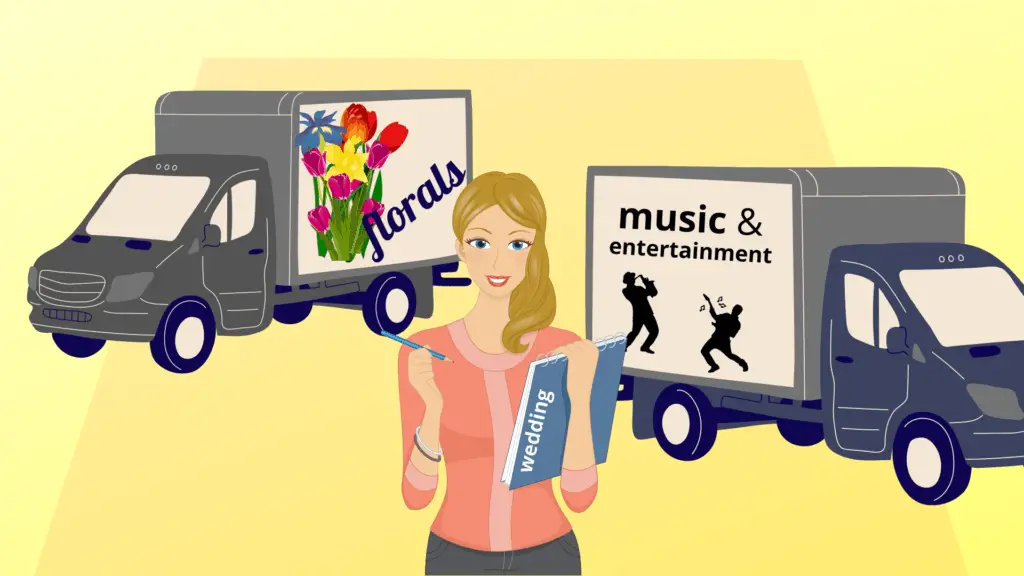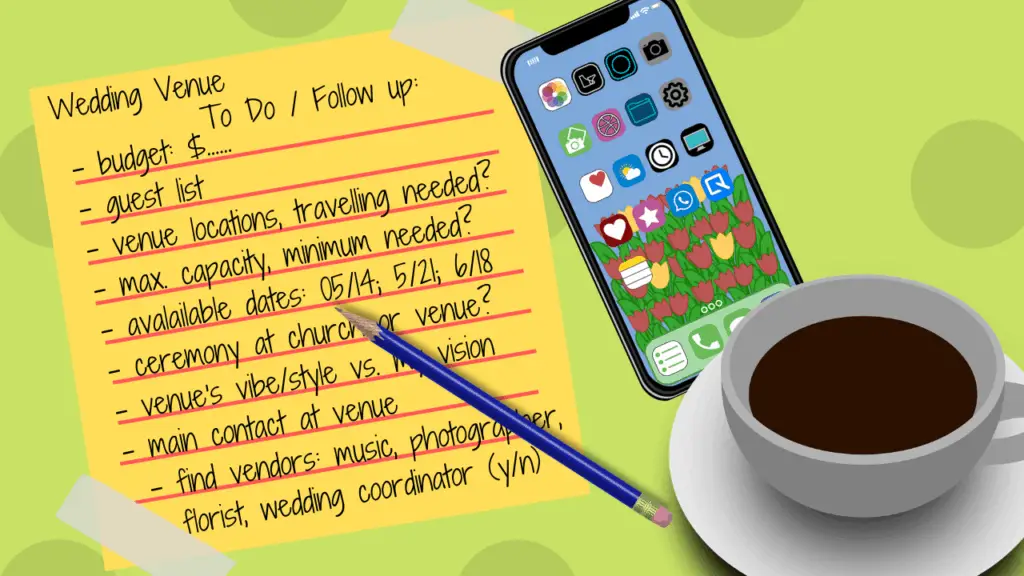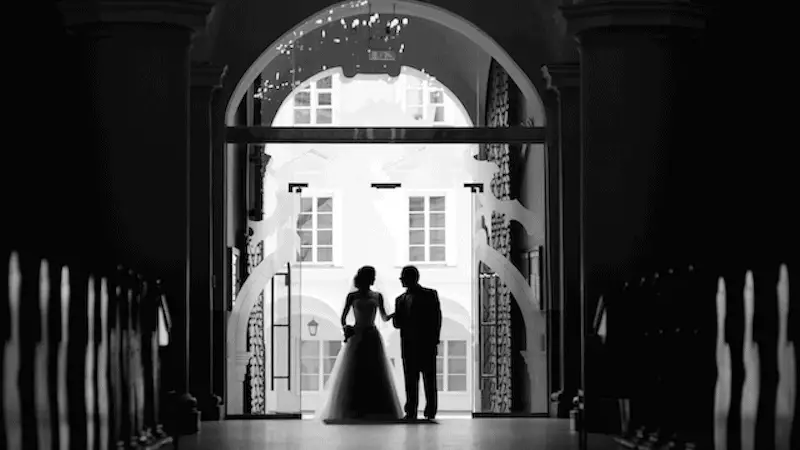27 Questions To Ask Before You Hire A Wedding Planner
Planning a wedding alongside work, life, and sleep can feel like a second job. The right wedding planner turns chaos into choreography; the wrong one burns time and money.
Use these 27 questions to vet any pro: confirm availability and workload, unpack pricing and scope, require on-site leadership, and make sure someone owns your minute-by-minute timeline.
Skim, star your must-haves, and bring them to your first call, so you hire the one who truly gets your vision.

Wedding planners do what?
Professional wedding planners are experts in their field. They offer personalized, one-on-one consultations and assist you through the entire process of planning your wedding.
Wedding planners provide services such as:
- helping you to select a venue
- conduct walkthroughs
- assist in picking and managing vendors
- analyze and explain contracts if requested
- help to explain costs to create a realistic budget
- aid with menu planning
- create seating arrangements and floorplans
- create timelines and keep you on top of your schedule
- help to communicate with venues and vendors
- arrange for transportation
- provide hands-on assistance and management on the day of your wedding
Since your wedding is an incredibly personal celebration, you want to choose a wedding planner you really like and who gets you. You will be working together side by side for months to come.
Key Questions To Ask A Wedding Planner
1. Are you available on the date of my wedding?
This is the first question you want to ask. Otherwise, you may as well go on to the next one on your list.
However, if you want to work with a certain wedding planner because of their great reputation and prestige and are willing to move your date for them, it may be worth seeing whether alternative dates are available at your wedding venue (How to choose a wedding venue).
2. How many weddings have you planned
You want to inquire about their experience level by asking how many weddings they have previously done, as well as how many weddings they typically do in a year.
Wedding planners can get overwhelmed, too. If they’re in charge of numerous weddings simultaneously, you may not always be able to reach them since they’ll have to allot their attention.
3. How familiar are you with our venue (or similar spaces)?
It’s helpful, not required, for a planner to know the space. You can ask:
- Recent experience: Have you planned an event here (or somewhere comparable)? Could you share guest count, a floor plan, and a sample day-of timeline?
- Key logistics to review together: Access hours, load-in route/elevator or dock, sound/curfew rules, power needs, candle/open-flame policy, room-flip timing, weather backup, and storage.
If the venue is new to them, a reassuring plan looks like:
- A scheduled site visit and measurements
- Introductions to the venue coordinator
- A simple logistics map, contact sheet, and first-draft timeline after the visit
Green flags: Specific examples, names, and a clear prep plan.
Gently watch for: “We’ll sort it out day-of” or no site-visit process.
4. How did they get into wedding planning?
Every great planner has a story. Hearing it tells you what they’re built for.
Ask:
- What did you do before planning (hotels/catering, production, design, corporate events)?
- How long have you planned weddings, and about how many per year?
- What types of weddings feel like “home” to you (tents, hotel ballrooms, cultural traditions, destination)?
- Do you lean logistics, design, or both? Who covers the part that isn’t your superpower?
- Any training or affiliations (CMP, CSEP, ABC, WIPA) or recent continuing ed?
Match their background to your needs:
- Logistics-heavy day (multiple spaces, tent build) → hospitality/operations or production roots.
- Design-led celebration (custom builds, styling) → strong design portfolio + fabricator partners.
- Cultural/faith-forward ceremony → specific experience and references for your traditions.
Green flags: Clear origin story, concrete numbers, portfolios that mirror your venue/guest count, and named vendor partners.
Gentle caution: Vague “I just love weddings,” no examples, or “we do everything” without proof.
5. How are your services structured in terms of pricing and action steps leading up to the day of my wedding?
Be upfront and honest with your budget and ask the wedding planner if they can work with it. This gives them a better starting point to illustrate their pricing and service structure.
- Would the wedding planner be paid in tiers of services or cost per hour/day/weekend/monthly fee?
- Do they offer a full-package situation leading you through the entire event from start to finish?
- What kind of consulting action steps are involved leading up to the day of your wedding?
- What type of package opportunities are available?
- How long does their service last on the day of your wedding, i.e., until the ceremony begins or through the end of the wedding? Would it include overseeing the vendors setting up at the venue, and breaking down the wedding, leaving the venue behind in good order?
- What parts of the wedding would you need to take care of that the wedding planner wouldn’t handle?
A word of advice: a wedding planner’s job is not to be your go-to source to find you the cheapest deals in town.
They have a keen awareness of what is possible in the current market. Their industry connections are usually with the best vendors in your region, and they will let you know what your options are.
Take the approach that you are hiring a manager rather than the cheapest deal finder.
6. Can I see a sample contract with pricing included before signing it?
Many wedding planners include helping you with the wedding venues’ and vendors’ contracts.
When it comes to their contract, ask if you can see an example if you believe it will help you with making a decision.
Asking them for a sample copy of their agreement will help you understand what you would need to commit to.
You will be able to fully understand what they are offering, dissect any concerns you may have, and compare their services with others before making a decision.
7. Who will be my point of contact?
Wedding planners are often a one-person operation, and they’ll work exclusively with you throughout the wedding planning process.
If your wedding is more complex, planners often hire assistants to support certain tasks. You would, at the very latest, meet them on your big day.
If you have hired a larger wedding planner team, be sure to ask who your designated point of contact will be.
- Do they have an office, what is the location, and what hours do they operate?
- What is the best way to communicate? Via phone, emails, texting, Zoom, or in-person meetings?
8. Can we talk to a couple who recently used your services?
If you’re getting cold feet, see if your wedding planner would be open to you talking with one of their recent clients about their experience. This can offer some valuable insight and help you make a more informed decision.
However, if you are dealing with a well-respected wedding planner, this inquiry may come over as insulting.

9. Do you have a great example of how you handled a difficult situation and how you solved the problem?
Even a perfectly planned event can encounter some glitches entirely out of the wedding planner’s, venue’s, or vendor’s control. Check with the planner if they had ever dealt with unexpected setbacks and how they handled the situation.
10. What is your cancellation policy if something were to happen and we had to cancel our event after booking with you but before the date has passed?
Is there a fee associated with canceling once booked as well as a penalty for late cancellations per month out from the event date (e.g., $xx per month starting one month out from the event)?
Are there any exceptions, such as illness or family emergencies, that would allow us to cancel?
11. What Happens If We Change Our Minds About Hiring You After Signing The Contract- Will There Be Penalties Or Fees To Break It Off Early?
It’s an uncomfortable question to ask, but things can happen. If you find out at some point that you do not see eye to eye with your wedding planner and it’s beyond repair, is there an escape clause in the contract that would let you walk away?
12. Will we receive a copy of all contracts, including those that are non-negotiable, before signing them?
You should clarify that you want to be involved in reviewing all contracts that pertain to your wallet and get copies. This is important as you would want the ability to cross-check and run your numbers simultaneously to correspond with the wedding planner’s math.
13. Will you provide an initial estimate on cost upfront, including all taxes and other costs that may incur during the planning process?
For instance, the estimate should include these items but is not limited to:
- Wedding planner’s fee
- Venue’s costs: food and beverage package, plus venue fee & possible labor costs
- If applicable, fees for renting chairs, tables, dance floor, lighting, props, linens
- Florist
- Entertainment (Band or DJ, musicians for the ceremony)
- Photographer / Videographer
- Ensure the estimate includes possible set up and tear down fees and review overtime fees that vendors may tag on.
14. How much of a deposit is required?
Find out how much downpayment is required when booking to secure the date and how much final payment you’ll need to give for all services before the event.
15. Can I see some of the events you’ve done before getting an idea of what my event might look like if I hire you as my wedding planner?
You need someone who understands your vision and can help you bring it into life. Let the wedding planner show you their portfolio. It will give you an idea of whether you feel the wedding planner can capture your vision or inspire you to something you did not have in your idea book.
16. How often will we meet, and how will we be working together?
You want to get a concept of how the weeks and months fill in with in-person meetings leading up to the wedding.
- When and where will you be meeting with vendors (i.e., florists, music, photographer, etc.) and the catering manager at the wedding venue?
- Will the wedding planner be present when you meet with vendors?
17. Will you communicate on my behalf on all aspects with the wedding venue and vendors moving forward?
Hiring a wedding planner can be a lifesaver if you are not the type of person who likes to negotiate and delegate. It would probably be your first time working with professionals you don’t usually work with daily.
Considering the services you have arranged with the wedding planner, find out if they would be handling all communication or if you would share any interaction with the wedding venue or vendors.
In any event, you should keep personally in touch with the catering sales manager at the venue and specific vendors regardless of your wedding planner as the main person of contact, even if it seems counterproductive to what your wedding planner was hired to do.
The more you remove yourself from the people who will run your wedding, the more impersonal and artificial the overall vibe could become, since they do not know you in person, and you have not built a relationship for them to go the extra mile.
18. Will you handle all follow-ups with the vendors and payments?
Another great thing about hiring a wedding planner could be that they would handle time-consuming follow-ups and logistics with your florist, band or DJ, possible rental companies, photographer, officiant, musicians for the ceremony, and a whole plethora of possible vendors.
When it comes to payments, find out if you would pay each vendor directly or if the wedding planner would handle the payments.
Find out what deadlines you have to keep for each payment. Venues, for example, would, in most cases, be prepaid in full at least two weeks before the wedding. Some vendors may be fully paid the night of the wedding, and some may accept sending you an invoice. It largely depends on each vendor’s business model.
19. Do we have to use your vendors only?
Wedding planners typically rely on using an infrastructure of vendors with whom they have established a positive relationship over the years. Each side knows precisely what the other is doing and is a reliable partner to put your wedding together.
However, don’t be shy to suggest vendors that you may know or have seen at other weddings who capture your vibe. If the wedding planner is not enthusiastic about working with them, ask why.
20. Will you handle overnight reservations at the venue or neighboring hotels and help arrange pricing for a wedding room block?
The chances are that you will have some out-of-town guests attending your wedding who need overnight rooms or guests who just like to make it a long weekend and possibly attend your wedding brunch if you are hosting one the next day.
Check if it’s part of your wedding planner’s service package to help to obtain special wedding room block rates for your guests and handle rooming lists with the hotel’s front office.
- If you are providing welcome bags/favors for your guests, check if your wedding planner would take over the logistics for them and even come up with some fun ideas. The welcome bags would need to be given out by the front office staff as guests check-in or be placed in their rooms.
21. Do you handle the guest list, mailing the invitations, and handling and synchronizing the RSVPs (répondez s’il vous plaît) with seating arrangements?
Naturally, you would need to know who you will be inviting to your wedding, but if working with spreadsheets is not your favorite thing, your wedding planner may include this in their services.
Wedding professionals have systems and processes in place to streamline and organize your guest list.
Your guest list is a significant project that will keep you busy until the wedding day, when everyone is seated for dinner.
It needs to be fail-proof with little to no room for error, especially when it comes to seating arrangements.
Once you are, for example, moving 250 guests from the cocktail reception into the ballroom, and guests are looking for their table and seats, it’s a train you cannot stop.

22. Will you help with the wedding rehearsal on the evening before the wedding?
Practicing your wedding ceremony beforehand is important to reduce stress on your wedding day.
Key Takeaway
For a calm rehearsal, use a clear sequence. See Mastering the Wedding Ceremony Order of Events to walk through who goes when and where during the processional and recessional.
If a wedding rehearsal is part of their service, your wedding planner or their assistant will handle this aspect of your wedding.
The wedding rehearsal will follow a step-by-step process, including the predetermined sequence of who will walk down the aisle, establishing the bridal party’s positioning in front of the room, and running through the recessional.
23. Will you personally handle the ceremony?
You would typically expect your wedding planner to handle your ceremony. It is one of the most critical moments of your entire wedding, and it will give you a sense of security to know who will be lining you up and time the processional as you have rehearsed it.
Sometimes you see this portion handed over to the on-site catering manager or staff or the wedding planner’s assistant. So make sure you know.
24. What kind of unexpected fees could incur?
Sometimes, you were not aware of expenses that could incur as they rise on a need-to-know basis. They could be self-evident to the industry professionals but may only be mentioned later.
A few standard extras to clarify: travel expenses, gratuities, parking, overnight accommodations, and vendor meals (food and beverages for the team working your wedding).

25. Will You Be On Site To Lead Vendor Load In, Set Up, And Strike From Start To Finish?
You want your planner physically present with authority to direct vendors and keep the venue team aligned. Ask for specifics, not general promises.
What to confirm
- Arrival time and earliest access to the space
- Who is the single point of contact from arrival to guest seating
- Vendor load in windows and loading zone or dock details
- Printed day of contact list with cell numbers for every vendor and venue lead
- Final walk through on arrival to verify floor plan, tables, chairs, linens, lighting, and rentals
- Power checks for band or DJ and any audio needs for the ceremony
- Placement of signage, place cards, escort cards, favors, and welcome table items
- Certificate of insurance collection and venue rule compliance for every vendor
- Holding area for vendor gear and empty boxes so guest areas stay clean
- Contingency plan for delays, no shows, or weather
- End of night strike plan that includes rentals pick up, trash removal, and room reset
Key Takeaway
On-site leadership is non-negotiable. Your planner should arrive before the first vendor, run a timed checklist, and stay through the final sweep so nothing is missed.
26. Who Will Be On Your Team And What Will They Handle On The Day Of The Wedding?
You are not hiring one person. You are hiring a coordinated crew. Get names, roles, and exact coverage so nothing falls through the cracks.
What to confirm
• Lead planner arrival and departure times
• Names and duties for ceremony captain, reception floor lead, setup lead, strike lead, and a float assistant
• Assistant to guest ratio and complexity add ons such as separate ceremony and reception spaces or tent builds
• Communication plan such as radios or a shared timeline app and who owns each channel
• Who manages lineup for processional, cueing for music and mics, and transitions between spaces
• Who places printed items such as place cards, escort cards, menus, table numbers, and signage
• Who handles personal items such as welcome table, card box, guest book, favors, and day of inventory
• Who oversees vendor meals and staff break coverage so service never stops
• Dress code and easy identification such as clipboards or badges so your family can spot them quickly
• Backup plan if someone is sick and how a replacement is briefed
• End of night coverage for strike, rental counts, and a signed room release with the venue
Smart staffing guide
• Up to one hundred guests: Lead planner plus one assistant
• One hundred to one hundred fifty guests: Lead planner plus two assistants
• Large guest counts or multi space setups: Add a setup lead and a strike lead
Staffing needs rise with live music, outfit changes, room flips, tenting, and complex cultural traditions
Expert Insight
Titles matter less than zones of ownership. Assign one human to the ceremony flow, one to the reception floor, one to vendor and rental logistics, and one to client care. That is why timelines run on time.
27. Will You Build A Minute-by-Minute Timeline And Run It All Day And Night?
A great planner does not just write a schedule. They own it in real time so vendors, the venue team, and your family move as one.
Deliverables you should receive
• A vendor operations timeline that covers the entire day from first arrival to final sweep
• A guest facing scenario that lists ceremony, cocktail hour, dinner, toasts, first dances, and the exit in the exact order
• A contact sheet with names, roles, cell numbers, and arrival windows for every vendor and venue lead
• A floor plan with tables, power needs, stage placement, and any room flip notes
• A distribution plan so every vendor receives the final timeline at least seven days before the wedding
What must be included in the timeline
• Hair and makeup start and finish times and who sits in each chair first
• Photography plan with first look, family groupings, and a backup rain option
• Transportation windows for limos, shuttles, and any rideshare staging
• Ceremony cues such as processional order, music starts, mic checks, and recessional timing
• Cocktail hour service plan, passed items, and specialty drink setup
• Dinner service pacing with clear moments for toasts, parent dances, and any cultural traditions
• Cake or dessert cue, late night snacks, last call, and the send off
• Strike plan for rentals, decor, band or DJ gear, and a room release with the venue
Mini sample day to show you the right level of detail
8 00 AM Hair and makeup begins
10 30 AM Photographer arrives and details flat lay
12 30 PM First look and couple portraits
2 00 PM Wedding party and family photos
4 00 PM Guests seated and prelude music
4 15 PM Ceremony begins
4 45 PM Ceremony ends and recessional
5 00 PM Cocktail hour begins and couple signs license
6 00 PM Guests invited to dinner
6 10 PM Grand entrance and first dance
6 20 PM Welcome and first course
6 45 PM Toasts
7 30 PM Main course
8 00 PM Parent dances and open dance
9 15 PM Cake or dessert
10 45 PM Last call
11 00 PM Formal exit
11 15 PM Strike begins and final room check
How To review and lock the plan
- Walk the venue with your planner and caterer at least seven days out and time the route between spaces.
- Add real buffers such as five minutes between each ceremony entrance and fifteen minutes for room transitions.
- Confirm who owns each cue such as music, mics, doors, lights, and the lineup.
- Send the final timeline to every vendor and ask for written confirmation.
- Print three copies for the bridal suite, the vendor staging area, and the venue office.
Pro Tip
Ask your planner to create a text friendly micro schedule for parents and wedding party that lists only when and where they need to be. Fewer questions, smoother day.
Expert Insight
The best timelines read like stage management. One person owns ceremony flow, one owns the reception floor, one owns vendor logistics, and one owns client care. That clear ownership is why events run on time.
Key Takeaway
A timeline is only as strong as the person running it. Make sure your planner writes it, shares it, and stands in the room to call every cue.
Have fun with this and take it easy. You are already one step closer just by having read this post.


